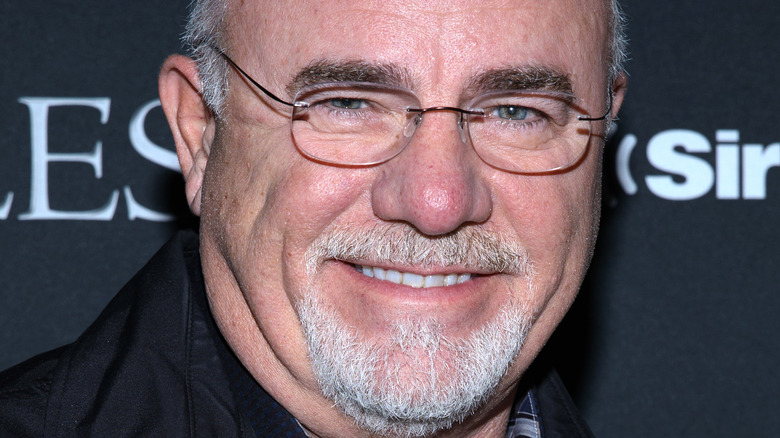Dave Ramsey's Worst Financial Advice
Dave Ramsey is a well-known television and radio personality. He's been offering investment and money management advice since 1992 and claims to have helped millions of people get out of debt. Ramsey is a respected figure in the world of personal finance advice, and his approach is a no-nonsense take on the realities of managing debt and finances. He starkly suggests that those in considerable debt should drastically shrink their social life and focus with intensity on paying off existing balances.
His attitude and candor have certainly helped many get out of debt, but Ramsey is guilty of some cardinal sins of the investing world. He advocates for debt reduction so heavily that he's gone so far as to say that people should put off saving for retirement in order to fully tackle debt. He also routinely talks up an annualized return figure of 12% when it comes to stock market math. These, in particular, are heinous oversights. But there are a few more issues that Ramsey brings into the picture when discussing financial planning and debt management on his platforms.
'Don't invest until you've paid off all your debts'
Dave Ramsey is a true warrior against debt. Much of his financial advice revolves around reducing and ultimately eliminating debt, and for those who are debt free he advocates against using new lending products altogether. On the surface, rallying against debt is beneficial. However, Ramsey often prioritizes debt to such an extent that it becomes detrimental advice. He suggests delaying retirement savings for anyone struggling with debt to direct more capital toward a faster payoff.
Paying down medical bills, student loans, auto financing, and credit card debt is absolutely important, but elevating it so much that you completely forgo saving for retirement is a maddening strategy that will all but guarantee you'll be working well into your golden years. When investing in stable growth assets, retirement funds double roughly every seven years. This means that $1,000 invested in your early 20s is likely to be worth around $64,000 when you reach retirement age (with six doubling periods). Similarly, for anyone working at a company that matches contributions, failing to invest in your retirement account means leaving free money on the table, slowing down progress even more. The reality of compound interest is that the earlier you save the less principal investment you have to develop to reach your retirement goals. Finding room in the budget to invest even a couple hundred dollars per month for your future is essential even if it means slower payoff of existing debts.
He urges people to prioritize paying off their home early
One feature of the typical debt load that Dave Ramsey often focuses on is the home. Ramsey urges people to prioritize paying off their home as quickly as possible. He isn't completely out on an island with this advice because he also suggests managing higher interest debts before focusing on mortgages — which sport some of the lowest interest rates among consumer lending products.
Even so, the idea that homeowners should prioritize paying down mortgage balances is ill-advised. He suggests that this should come before tackling other savings goals or starting to invest in renovation projects, family vacations, and other enriching lifestyle purchases. Getting out of debt completely is a noble goal, but the reality is that mortgage lending is a different kind of debt than virtually any other, and maintaining a balance on your mortgage (as well as a history of on-time payments) is beneficial for many reasons. For one thing, maintaining this repayment obligation helps boost your credit score over the long term and will afford you a beneficial platform with which to apply for future lending needs. Interest paid on your mortgage loan is also tax deductible, potentially adding an essential value swing in the right direction come tax time every year.
'Stick to growth stock mutual funds'
Mutual funds are often at the tip of Dave Ramsey's investment sphere. Specifically, Ramsey suggests investing in actively managed growth funds that provide quality returns consistently. Growth funds and others that offer a history of stability rather than volatile ups and downs are generally a great option for investors looking to save for retirement over many decades. But where Ramsey steers investors wrong is in his choice to select actively managed funds.
Professional stock pickers rarely beat the market consistently, and the longer the timeline studied the worse they perform in comparison. An actively managed fund is routinely rebalanced by a human investor who researches companies and picks stocks. In contrast, an index fund or a passive ETF is a stock asset that is managed by an algorithm or any other set of rules that govern rebalancing. Aside from the fact that passive funds consistently outperform active ones, returns can often come in at similar levels. However, passive funds have another distinct advantage that makes actively managed funds obsolete in all but the most specific circumstances. Nearly every ETF or mutual fund that you can buy will come with a management fee, but passive funds are much cheaper than active ones. If the returns are going to be similar in the best-case scenario, there's no point in also paying more for the asset and losing a greater proportion of your principal investment.
'Don't use credit cards'
The idea that credit cards are to be avoided at all costs is one that's commonly held among the world's wealthiest personalities. Dave Ramsey is no different, but he takes it a step further and wages war on the practice of leveraging debt. He is repetitive on this point and quick to suggest that consumers should pay off their credit card debt and then cancel their accounts.
Credit card usage is often problematic, and offers like cash-back rewards come with major strings attached. But even with high interest rates and a bevy of potential pitfalls and drawbacks, credit cards remain a valuable tool that a gigantic proportion of the consumer marketplace utilizes regularly. 84% of Americans had at least one credit card in 2021, showcasing the overwhelming presence of credit tools in the marketplace. Ramsey's insistence on cutting the credit card cord is good advice on the surface but it rings hollow for many who have come to rely on this resource. For the average card user, paying off credit card debts and canceling accounts not only will take considerable time but can also be highly damaging to their credit score. Indeed, part of the reason that credit cards are so prominent is the value they bring to consumers in areas beyond cash-back rewards and other perks. Intelligent credit card management grants a variety of financial benefits, including favorable borrowing avenues for things like a mortgage or auto financing.
When it comes to student loans: 'Do. The. Work'
Dave Ramsey suggests that people carrying student debt shouldn't complain about this financial burden or look for someone else to bail them out. When the Supreme Court rejected the government's student loan forgiveness plan many people felt betrayed. The plan would have seen billions of dollars wiped clean from millions of borrowers' plates.
Ramsey is perhaps correct in his assessment that the student debt crisis isn't going to be resolved anytime soon. But this doesn't mean that there are no avenues for debt relief, intelligent debt management, or even wholesale loan forgiveness. For one thing, many student borrowers who make 20 years' worth of income-driven repayments can have the remainder of their loan balance forgiven. For those who went to graduate school or achieved a doctoral degree after many additional years of study, this could equate to a substantial volume of debt wiped clean. Similarly, those who work with Teach for America may also be eligible to have their loans eliminated.
It's worth noting that there's more to this story than just repaying a debt burden. Education has become increasingly costly with the bill for an undergraduate degree doubling in just the last 20 years alone. Coupled with the fact that wages have been stagnant for the last 50 years, students are absolutely entitled to some soul searching and questions for those in power about what value these loans are actually providing to the individual and to society as a whole.
He is all in on the 'debt snowball method'
Dave Ramsey is a big proponent of the snowball method for paying off debts and touts this above any other option as a universal recommendation. The trouble here is found in Ramsey's universal prescription. The debt snowball method is a valuable tool that sees borrowers paying off the smallest balance owed first while making minimum payments to every other credit card and other account requiring monthly contributions. Once the first account has been cleared, the money directed to that bill plus its minimum payment can then be applied to the next smallest balance. Then, rinse and repeat until you've finished paying off each of your debts. This creates a snowball effect in which increasingly larger repayment amounts are piled on to one debt after another.
But the debt snowball method isn't the cheapest or fastest way to pay off numerous credit card bills. The avalanche method instead focuses on the most expensive debt you have, meaning the account with the highest interest rate. This will see you save hundreds if not thousands of dollars over the course of your payoff plan and get you out of debt faster. The purpose of the snowball method is to reduce the number of accounts you're paying off quicker while creating positive momentum to hit milestones faster. It's psychologically advantageous but it isn't the best strategy for everyone trying to get out of debt.
'Don't support children or grandchildren financially'
Another thing Dave Ramsey is known for is the insistence that parents and grandparents shouldn't support their younger family members. This means gifts and loans of any sort. In Ramsey's estimation, these relationships are something to be treasured and adding money into the mix can tarnish an otherwise beautiful family dynamic.
Ramsey's assertion isn't necessarily problematic. Money often muddles the waters in familial relationships and can certainly feature as a point of tension. However, the idea that family members should never help each other financially contradicts the reality of the modern world. Wage stagnation and the continuously inflated cost of living means that it's harder than ever to make ends meet. The result is that grown children are often living with parents or other family members for longer. They may also require assistance getting started with a down payment for a home or deposit for a rental property, among other things. Every family will have its own unique circumstances, and offering financial support may be the only way to lift a child into the next phase of their life. Alternatively, financial support may not be feasible due to family size or income constraints. The reality is that every family will be challenged by different circumstances and graced with unique strengths. A one-size-fits-all solution like this isn't good advice because it doesn't take into consideration both the modern financial landscape and the varying financial circumstances of households across the country.
'All debt is bad'
Like many high net worth investors and financial advice personalities, Dave Ramsey subscribes to the idea that all debt is bad. Ramsey commonly talks about the fact that he lives with no credit profile whatsoever. Living without debt means that any outgoing expense is a personal choice. No financial institutions or individuals that have a claim on your money, which is certainly a liberating feeling. However, for a consumer who isn't a multimillionaire like Ramsey, credit cards and a credit history are prerequisites for everyday life. Setting up a new utility account when you move requires a credit check, and renting a car when traveling for business or vacation demands either a gigantic cash deposit from your debit account or a more reasonable hold on your credit card. Most well-off individuals who have burst through the middle class and can consider themselves objectively rich can't typically claim to live totally debt and credit free.
Moreover, not all debt is created equal. The average credit card is mired with an interest rate of about 27% while the typical mortgage loan taken out in January 2024 is marked by a far less noxious 7% APR. These two lending products simply aren't in the same universe when it comes to their relative costs. Revolving credit card balances are bad for your financial health, but a mortgage or low interest personal loan are valuable assets that can help consolidate debt or get you into your own home.
Dave Ramsey incorrectly touts a 12% annualized average return figure for the S&P 500
Perhaps the most explosive advice that Dave Ramsey offers to his listeners comes in the form of his investment math. It's common knowledge that the stock market has continuously trended upward basically from its inception.
Even with consistent growth appearing as a long trending historical marker, Dave Ramsey makes an incorrect assessment when discussing his favored marketplace metric, the S&P 500. Ramsey speaks of a 12% annualized return for the S&P 500, but conflates two separate data points when coming to this figure. Unfortunately, Ramsey isn't alone in this mistake. Many marketplace analysts suggest that the S&P 500 has experienced this level of dominance, specifically dating back to 1926. Instead, the index has enjoyed an average return of about 8%. Calculating the difference while contributing $245 per month starting at age 25, a retiree leaving the workforce at 67 will yield just over $1 million in retirement savings. But with a 12% annualized return that same goal only requires about $67 per month. Chopping your contribution down by such an extreme based on a faulty expected return will leave you with about $276,000 rather than the million you may have budgeted to create. His insistence on this pipe dream is immensely damaging and ludicrously misguided. And yet he posted on January 5th that: "$100 a month invested from age 25 to 65 is $1,176,000." This is simply not true.
He advocates for the 15-year mortgage
Because Dave Ramsey is such an aggressive debt reduction advocate, he naturally suggests that home buyers should opt for a 15-year mortgage rather than the more typical 20 to 30 year timeframe. The shortest possible duration will indeed save substantially on interest payments and get the debt cleared faster. However, there are some significant drawbacks to this approach. A shorter repayment timeline means that your monthly contribution will be substantially higher. The more you must repay the less money you'll have for other expenses that may come up. Many home buyers purchase a home with plans to make the property their own right away. A high monthly contribution figure can reduce your ability to conduct renovations in the property or rule some changes out entirely.
Finding yourself "house poor" isn't the only consequence of a shortened mortgage repayment term. By opting for a longer duration, borrowers give themselves flexibility that wouldn't otherwise be available. Calculating repayment figures for a 15-year mortgage and then paying that number rather than the minimum contribution required from a 30-year term will see your mortgage paid off in the same amount of time and for the same cost. Yet, the ability to reduce your contribution at any time remains a viable safety net. Illness, a lost job, or any other hardship doesn't have to be a death blow to your dreams of homeownership if you opt to overpay rather than set a high minimum requirement from the start.
He suggests drawing from retirement savings at a rate of 8%
Returning to Dave Ramsey's investment advice, the financial personality suggests that once you reach retirement age you should draw down funds from your retirement account at an 8% withdrawal rate. Based on his 12% growth map, an 8% drawdown would allow your principal to remain essentially untouched for as long as you live. If you've managed to amass a $1 million retirement account, 8% results in an $80,000 retirement income in perpetuity. However, these figures demand that the market — and by extension your investment account as a whole — grows at 12% every year.
The math simply doesn't work because a 12% growth rate isn't the reality of the S&P 500, and an annualized rate of growth doesn't account for year-over-year fluctuations. In December 2021, the index had grown by 28% while the next year it retracted by 18%. Moreover, the S&P 500's return is 8%, making a drawdown at the same level a detrimental force. These figures mean that your average withdrawal rate should be significantly less than Ramsey's suggestion if you're aiming to preserve the principal value of your retirement account. More importantly, you'll need to realize that with fluctuations in the market you may be best served by not taking a standard withdrawal figure every year if maintaining value is a high priority.











